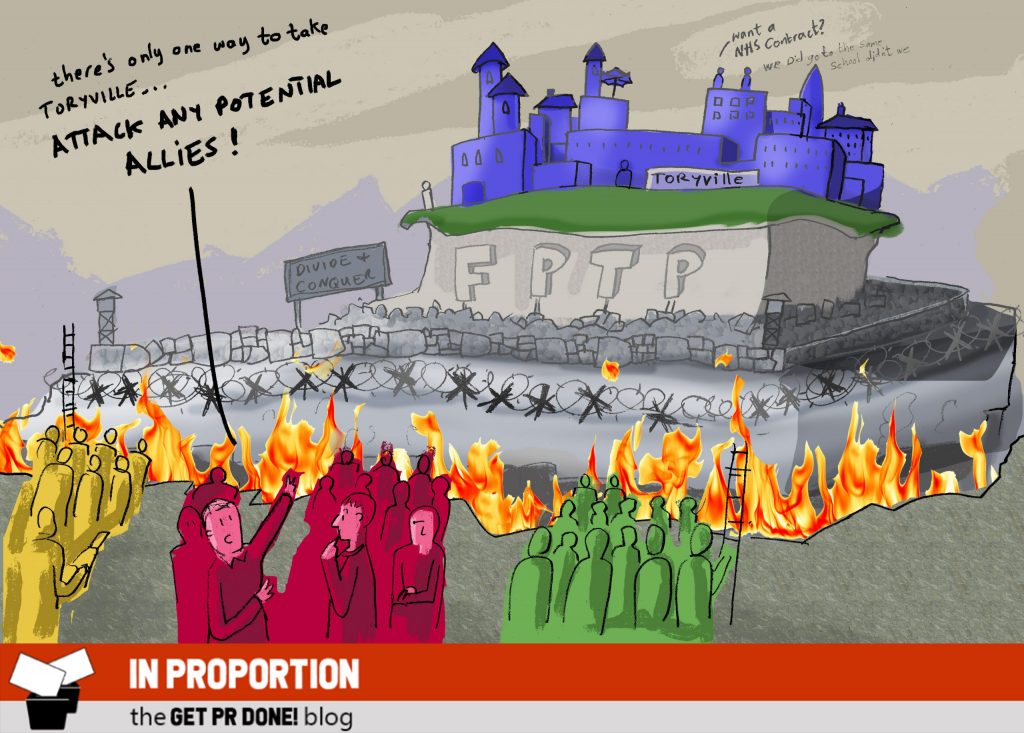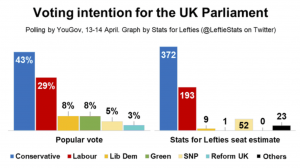
Whether the next General Election is held in 2024 or earlier, Labour faces a huge challenge. It is generally acknowledged that should the main opposition party suffer its fifth electoral defeat in a row, its survival as the oldest ‘social democratic party’ in the Western World will be at stake.
A review of why Labour lost in 2019 by the cross-factional network Labour Together estimates that in order to win a majority of just one under the existing First-Past-the-Post (FPTP) voting system, Labour would have to win an additional 123 seats. They would need a uniform swing of 10.52% to achieve this. This would be a larger swing than Tony Blair’s landslide of 1997 and the post-war election of 1945.
“MOUNTAIN TO CLIMB”
The authors of the review commented further: “This is a mountain to climb “ and warned that this is “something no major party has ever done”.
The review also highlights the fragility of what Labour already have: that there are 58 seats across the country which would only require a small swing from Labour to the Conservatives to be lost.

Furthermore, Labour has never won a General Election with less than 37 seats in Scotland. Currently, they hold just one.
Given the rise and dominance of the SNP in Scotland, for at least the foreseeable future, it is difficult to see how Labour will regain anything like the number of seats it needs from Scotland to win nationwide.
MISSION IMPOSSIBLE
It is also expected that the pending redrawing of constituency boundaries will result in a loss of 9 seats for Labour and a gain of 15 seats to the Conservative.
The umbrella group Compass, in their We Divide, They Conquer report (December 2020) concludes that, in order to close the gap alone, Labour would need to win 148 more seats than they did in 2019.
Under the FPTP voting system, the challenge for Labour towards the next General Election therefore is not so much a case of “a Mountain to climb” as diplomatically suggested by the commissioners of the Labour Together Report, Ed Miliband and Lucy Powell. It is more a case of Mission Impossible.
The Conservative Party are of course very happy to retain FPTP: it is in their long-term interest. It cannot be a coincidence that they are proposing legislation to abolish the Proportional Representation (PR)/Single Transferable Voting model presently applied for the Scottish, Welsh, Northern Ireland, Mayoral and Police Commissioners’ elections.
This confirms that the only way to defend our democracy, workers’ rights and indeed all human rights in the UK, is to adopt a voting system where every vote counts and where the House of Commons represents the views of the majority.
So, the question that must be put to the 16 million majority who did not vote for the Conservative/Brexit Party coalition in 2019 is this: do we want to be ruled by an increasingly authoritarian conservative administration for the next decade?
UNDERSTANDING LABOUR’S BLIND SPOT WITH FPTP
PR is simply not in Labour’s DNA. All of the party’s many achievements in government have of course been made under FPTP so the notion that FPTP will no longer work for Labour is a difficult one to get across. To understand this, we have to ‘get’ Labour’s entrenched tribalism.
Labour is a political party born out of working class struggles in the 19th century. It was created to represent the interests of the great majority of the population – the working class. Labour Party and trade union activists generally perceive nearly all other parties as class enemies who take votes away from the party engaged in the real ‘struggle’. Under FPTP, the winner takes all: “you are either with us or you are against us”.
CHANGING DEMOGRAPHICS
Accustomed to being the dominant Party in large parts of the old industrial regions and the poorer neighbourhoods of London and larger cities, Some Labour activists find it almost impossible to come to terms with the fact that the FPTP voting system has ceased to deliver victory for them.
The fact is that the working class is no longer a monolithic, socio-economic entity based on mining, steel making and manufacturing because these industries largely no longer exist. As work has dramatically changed since the Thatcher era, so has the workforce. As analysed by Demos backed up by a multitude of academic research, what was the working class has now become deeply fragmented.
Fewer workers are now joining a trade union, although it would seem that new forms of ‘community’ trade unions have started to recruit and make progress amongst workers in the “gig” economy.
As a result of all those changes, a large percentage of the working class have simply ceased to be loyal to Labour. It has been estimated that 3.5 million former Labour voters switched to the Conservative at the “Brexit” General Election of 2019 and so far there is no clear indication that they will return.
LABOUR’S GAMBLE
The idea that a more politically cautious and moderate leader will somehow attract those millions of working class “deserters” back to the fold appears to be part of Labour’s current electoral strategy. If the polls are to be believed, it is a strategy that doesn’t seem to be working,.
Two questions for all supporters of PR, both inside and outside the Labour Party:
1 How do we convince Labour’s party leaders and the anti-PR activists and Trade Unions that Labour is unlikely to ever achieve power again under FPTP?
2 How do we persuade them to commit to a new voting system where every vote counts and where the democratic will of the majority is respected?
For if we can do neither of these, a Conservative minority administration may continue to rule in perpetuity.
+++++++
IN PROPORTION is the blog of the cross-party/no-party campaign group GET PR DONE! We are campaigning to bring in a much fairer proportional representation voting system. Unless otherwise stated, each blog reflects the personal opinion of its author.
We welcome contributed blogs. Send a brief outline (maximum 75 words) to getprdone@gmail.com